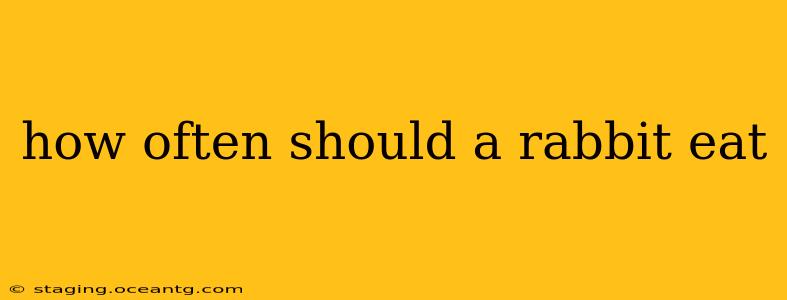Rabbits are adorable, fluffy creatures, but their dietary needs are more complex than many pet owners realize. Understanding how often and what to feed your rabbit is crucial for their health and well-being. This guide will provide a comprehensive overview of rabbit feeding schedules, addressing common questions and concerns.
How Many Times a Day Should I Feed My Rabbit?
Ideally, rabbits should have access to unlimited hay. This means a constant supply of fresh, high-quality hay should be available throughout the day and night. Hay forms the cornerstone of a rabbit's diet, providing essential fiber for gut health and preventing dental problems. Think of hay as their "main course."
In addition to unlimited hay, your rabbit will also need a daily ration of fresh vegetables and a small amount of pellets. The quantity of pellets and vegetables will depend on your rabbit's size, age, and activity level, but generally, they should be fed once or twice a day. Never free-feed pellets, as they are calorie-dense and can lead to obesity and other health problems.
What Kind of Hay Should I Feed My Rabbit?
High-quality grass hay, such as Timothy hay, orchard grass, or oat hay, is best for adult rabbits. Alfalfa hay is higher in protein and calcium, making it more suitable for growing kits (young rabbits) or pregnant/lactating does. Always ensure your hay is fresh, green, and free from mold or dust.
How Much Hay Should My Rabbit Eat?
The amount of hay a rabbit consumes depends on their size, breed, age, and activity level. However, as a general rule, a rabbit should always have enough hay to keep them comfortably occupied. A good guideline is to offer an amount approximately equal to the rabbit's body size.
What Vegetables Can I Feed My Rabbit?
Dark leafy greens are excellent additions to a rabbit's diet, offering essential vitamins and minerals. Good options include:
- Kale
- Spinach (in moderation)
- Romaine lettuce
- Parsley
- Cilantro
- Basil
Introduce new vegetables gradually to avoid digestive upset. Always wash vegetables thoroughly before feeding them to your rabbit. Avoid feeding iceberg lettuce, as it offers minimal nutritional value.
Should I Give My Rabbit Pellets?
Pellets can be part of a rabbit's diet but should be offered in moderation. Choose high-quality pellets formulated specifically for rabbits, and avoid those containing added sugars or artificial ingredients. Overfeeding pellets can lead to obesity and dental problems.
How Many Pellets Should My Rabbit Eat?
The amount of pellets will depend on your rabbit's size and age. Generally, adult rabbits only need a small handful (about ¼ cup) per day, while growing kits will need more. Always consult with your veterinarian for specific recommendations for your rabbit.
What About Treats?
Treats should be given sparingly. Fresh fruits and vegetables, like small pieces of apple, banana, or carrot, can be offered as occasional treats, but they should not make up a significant part of your rabbit's diet.
When Should I Be Concerned About My Rabbit's Eating Habits?
Any significant changes in your rabbit's eating habits should be cause for concern and warrant a visit to the vet. This could include:
- Sudden loss of appetite: This could indicate illness or pain.
- Refusal to eat hay: Hay is crucial for digestive health, and a refusal to eat it is a serious problem.
- Excessive weight loss or gain: Both can indicate underlying health issues.
- Changes in stool consistency: This can be a sign of digestive problems.
Remember, consulting with your veterinarian is crucial to determine the best feeding schedule and diet for your individual rabbit. They can provide tailored advice based on your rabbit's age, breed, health, and activity level. Regular veterinary check-ups are essential for maintaining your rabbit's overall health and well-being.
